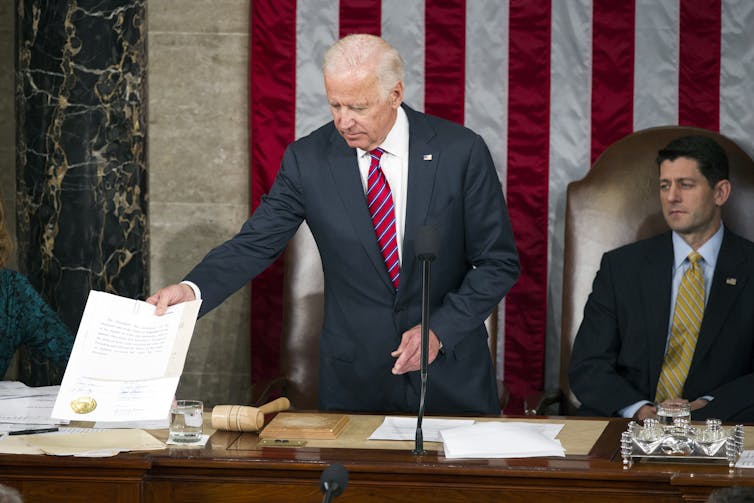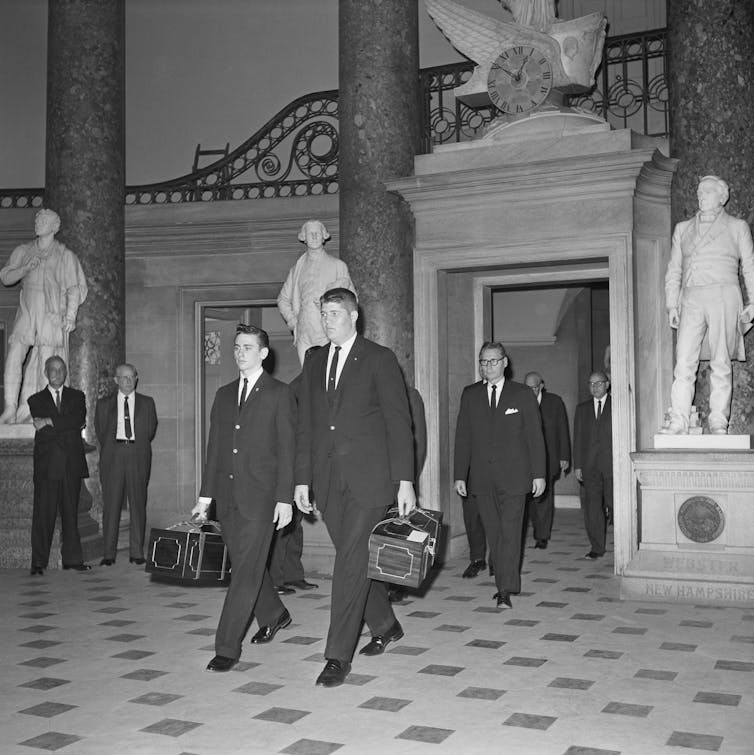News
PBS NewsHour – February 3, 2022 (04:23)
Associated Press, February 3, 2022 – 6:00 pm (ET)
https://apnews.com/article/biden-says-us-raid-syria-killed-islamic-state-group-leader-ca598136de014e008f746a35f6f721b0
Associated Press, February 3, 2022 – 9:30 am (ET)
https://apnews.com/article/biden-says-us-raid-syria-killed-islamic-state-group-leader-ca598136de014e008f746a35f6f721b0
Associated Press, – February 3, 2022
The leader of the violent Islamic State group died in a U.S. military raid Thursday, blowing himself up along with members of his family as American special operations forces assaulted his hideout in northwestern Syria, President Joe Biden said.
It was the second time in less than three years that the U.S. took out a leader of the group that at the height of its power controlled more than 40,000 square miles stretching from Syria to Iraq and ruled over 8 million people.
U.S. officials called the operation a “significant blow” to the organization, which has been trying for a resurgence with attacks in the region, including an assault late last month to seize a prison in northeast Syria holding at least 3,000 IS detainees.
The raid targeted Abu Ibrahim al-Hashimi al-Qurayshi, who took over as head of the militant group on Oct. 31, 2019, just days after leader Abu Bakr al-Baghdadi died during a U.S. raid. Al-Qurayshi, unlike his predecessor, was far from a household name, a secretive man who presided over a far diminished version of the group and didn’t appear in public.
PBS NewsHour, February 3, 2022 – 1:00 pm to 1:30 pm (ET)
PBS NewsHour – February 2, 2022 (06:44)
The Conversation, – January 20, 2022
Concerned about potential problems during the next election when Congress counts presidential votes, some legislators are interested in reforming the federal law that governs that process, the Electoral Count Act.
Reforming the act, which sets the procedures for how votes for president are counted in the Electoral College, means identifying what it’s supposed to do, the areas that need reform and any other problems with it.
As a scholar of election law, I recognize that presidential elections in the United States are complicated. Voters do not directly elect the president. After Election Day, and based on the popular vote, each state chooses presidential electors who formally meet and cast votes for president that are then relayed to Congress. There are 538 electoral votes, and after Congress counts them and verifies that one candidate has received a majority – at least 270 – the winner of the presidential election is declared.
In theory, a rule about how to count votes seems easy enough. But it’s hardly been easy.
Abusing the act
During Reconstruction, the period after the Civil War, Congress faced contentious questions over whether Southern states appropriately appointed presidential electors. At other times, two sets of competing electors for different candidates were sent to Congress.
The Electoral Count Act was enacted in 1887 to streamline rules after the disputed presidential election of 1876.
But in recent years, the act has revealed some weaknesses.
The act allows members of Congress to object to counting votes from a state. They can do that if one member of the House and one Senator write an objection. The Electoral Count Act does not list what kind of objections are proper, leaving it to Congress to decide if objections are appropriate or not. If this kind of dispute arises, Congress can debate what to do with the electoral votes.

The objection mechanism was used just once in the first 100 years of the act.
But in 2005, members of Congress objected to counting Ohio’s electoral votes cast for George W. Bush, alleging the results were inaccurate because of voter suppression and faulty voting machines. Congress spent two hours debating whether to count the votes. Other members of Congress unsuccessfully attempted to object in 2001 and 2017 to other states’ electoral votes – no senator joined those objections. In 2021, members of Congress again objected to counting Arizona’s and Pennsylvania’s electoral votes for Joe Biden, alleging a variety of claims, including fraud, which forced Congress to spend more time in debate.
These objections have undermined confidence in the outcome of presidential elections. Members of Congress publicly aired baseless claims that the election results were in doubt. There was no serious reason for Congress to doubt the outcome of the 2020 election.
One reform might simply increase the threshold required to file an objection, from one member of each chamber to, say, one-fifth or one-third of the members. That would speed up counting and reduce opportunities for members of Congress to take grievances to the floor.
Power that does not exist
Another problem that has emerged relates to the vice president’s role in counting electoral votes.
An impetus for the Jan. 6, 2021, attack on the Capitol was a mistaken belief that Vice President Mike Pence could ignore the Electoral Count Act and unilaterally refuse to count electoral votes from some states or indefinitely delay counting.
The Constitution mandates that the President of the Senate – typically the Vice President – open the certificates of electoral votes from each state. In addition, under the current Electoral Count Act, the President of the Senate presides over the meeting, calls for objections, and generally moves the process along.
Pence did so, despite intense pressure from President Donald Trump to reject the Electoral College votes that would formally make Democratic candidate Joe Biden president.
But there are worries among some members of Congress that another vice president might be tempted to assert power that does not exist. A vice president might create chaos by claiming that some votes should not count, or telling Congress what it can or cannot do, setting off a fierce debate in the middle of the count.
So another reform to the act might make it clear that the vice president has no role over the meeting except ministerial acts like opening the envelopes from presidential electors. That clarity reduces opportunities for mischief in the future.
These two concerns reflect the narrow role of Congress in counting votes and the mechanics of that meeting.

Improvement – or more complexity?
There are more ambitious changes to federal law that Congress might examine, but these also raise thorny problems.
For instance, some Republican state legislators in 2020 – encouraged by Trump – suggested they could appoint their own electors well after Election Day if they were dissatisfied with the results certified by the state’s election officials.
Some cited a provision in federal law that if the state “failed to make a choice” for choosing presidential electors on Election Day, the state legislature could appoint them later. But this provision was designed for states that required majority winners in presidential elections and might hold a runoff after Election Day if no candidate received a majority.
Congress could repeal this “failed to make a choice” provision and insist that Election Day is Election Day, with no opportunity under the statute to second-guess the results. But there are complications that arise with even a simple reform like this.
A state might suffer a terrorist attack on Election Day or be hit by a hurricane the night before. Should the state have a chance to hold its election a week or two later? And if so, how does Congress define the circumstances when a state could hold a later election?
Other proposals call for more robust involvement of the federal courts. From my perspective, it seems better that the judiciary should review serious challenges to the vote before Congress counts. Federal courts have been increasingly active in reviewing election-related cases ever since the Supreme Court’s contentious decision in Bush v. Gore affecting Florida’s recount in 2000, which resulted in Bush winning the election.
But that can invite additional questions. Elections are run by states, and states already have extensive procedures in the canvass, recount and audit of their votes.
When and how should federal courts get involved? It’s not clear that courts could do anything differently – or, more importantly, better – than they already do. And it may invite every presidential election – close or not – to end up in federal court, inviting a dozen Bush v. Gores each election.
One benefit of Electoral Count Act reform is that it lends itself toward bipartisanship. No one knows what future presidential elections will bring. Republicans and Democrats in Congress have both expressed disapproval of some states’ presidential election outcomes over the last 25 years, and it’s not clear who will be disappointed next.
Congress cannot prevent all mischief, but it can reduce the possibility of mischief in the future. Congress can address some of the easier questions, like the threshold for objections and the role of the vice president. It can also have serious conversations about some of the more controversial questions. It can determine if an amended law can make things better – or just invite more complexity and controversy.
CNN, – February 1, 2022
Bipartisan talks to overhaul the Electoral Count Act — an 1887 law under scrutiny in the wake of the January 6 attack on the US Capitol — face an uncertain future and key hurdles as lawmakers scramble to secure a deal and pass a bill before a narrow window of opportunity closes ahead of the 2022 midterms.
There is serious interest from both Democrats and Republicans in updating the 19th century law that details how Congress counts Electoral College votes from each state and talks are gaining momentum, but the effort is still in its early stages and drafting legislation and finalizing a bill will take weeks if not months, according to people involved in the effort.
“We are at the beginning stages,” Sen. Chris Coons, a Democrat from Delaware, said of the effort to reform the law.
The challenges facing lawmakers underscore how even an election reform proposal with bipartisan support faces a long way to go after Democratic-led efforts to enact far more sweeping voting legislation failed repeatedly in the Senate. Adding urgency to the election reform push, former President Donald Trump continues to spread lies about the 2020 election in a preview of the kind of message he could make the centerpiece of a future campaign if he decides to run again.
Reuters, – February 3, 2022
Republican state lawmakers in Georgia are pushing legislation to redraw electoral maps in three counties in a move that would effectively override local officials who have traditionally wielded that power in what has become a battleground state.
Democrats and voting rights activists say the moves are norm-busting power grabs for county commissioner seats that could significantly impact governance in areas with large minority populations. Republicans say they need to protect their constituents amid a period of intense demographic change.
The legislative maneuvers in Gwinnett, Athens-Clarke and Cobb counties all relate to the once-a-decade redistricting process in which local officials typically redraw the maps for commissioners and the state legislature approves them in a rubber-stamp vote. Commission chairs are elected county-wide, while members, or commissioners, are elected by district.
“What we are looking at is this idea that Republicans can use their power at the state legislature to circumvent local control,” said Atlanta state Representative Bee Nguyen, a Democrat who is also a candidate for secretary of state. “It is setting a new precedent that is dangerous in nature.”
CNN, – February 3, 2022
The US is alleging that Russia has been preparing to “fabricate a pretext for an invasion” of Ukraine, this time using a “graphic” video that would depict a fake attack against Russia.
A senior administration official told CNN that the US has intelligence suggesting that the Russian government, with the help of Russia’s intelligence services, has been planning to produce a propaganda video depicting graphic scenes of a “staged false explosion with corpses, actors depicting mourners, and images of destroyed locations and military equipment,” the official said. The US believes Russia has already recruited actors to be involved in the fake attack.
The US believes that the military equipment used in the video of the fabricated attack would be made to look like it is Ukrainian or from an allied nation. The official said the video could include images of Bayraktar drones, which NATO ally Turkey has provided to Ukraine, “as a means to implicate NATO in the attack.”
The fake attack in the video would be aimed against Russian sovereign territory or against Russian-speaking people, the official said, and would “be released to underscore a threat to Russia’s security and to underpin military operations,” the official said. “This video, if released, could provide Putin the spark he needs to initiate and justify military operations against Ukraine.”
FivethirtyEight, February 3, 2022 – 9:00 am (ET)
https://fivethirtyeight.com/features/why-joe-manchin-and-kyrsten-sinema-will-probably-vote-for-bidens-supreme-court-pick/
FivethirtyEight, – January 27, 2022
With Wednesday’s news that Justice Stephen Breyer will retire from the Supreme Court at the end of its current term, Democrats have avoided their worst-case scenario for the nation’s highest court: that Republicans would take control of the Senate before Breyer retired, allowing Sen. Mitch McConnell to keep Breyer’s seat open to eventually replace the liberal justice with a more conservative one.
But that fear has now been replaced by a different one. Although Democrats currently enjoy control of the Senate, it is by the narrowest of margins: 50-50, with Vice President Kamala Harris as the tie-breaking vote. And two members of the Democratic caucus, moderate Sens. Joe Manchin and Kyrsten Sinema, have already torpedoed several major Democratic priorities, including voting-rights legislation and the Build Back Better Act. Could Manchin and Sinema delay — or even block — the confirmation of Breyer’s replacement too?
Based on past judicial confirmation votes, it’s unlikely. The Senate has been remarkably efficient at passing President Biden’s judicial nominees so far: During the first year of his presidency, 42 of Biden’s district-court and appeals-court nominees have been confirmed — more than any president since John F. Kennedy.

